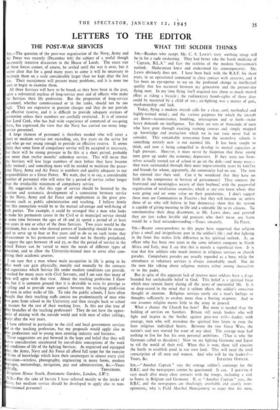Sta,—Recent correspondents to this paper have suggested that religion plays
a small and insignificant part in the soldier's life ; and that fighting in the front line makes little difference to his spiritual outlook. As an officer who has been two years in the same infantry company in North Africa and Italy, may I say that this is merely a superficial view. It is true that few soldiers take much interest in religious services or church parades. Compulsory parades are usually regarded as a bore, while the attendance at voluntary services is always remarkably small. Nor do the men like talking about religious matters either among themselves or to the padre.
But in spite of this apparent lack of interest most soldiers have a deep- founded but unshakeable belief in God. This belief is a spiritual force which may remain latent during all the years of uneventful life. It is so deep-seated in the mind that it seldom affects the soldier's conscious thought dr emotion. Religious services rarely stir a man's feelings or thoughts sufficiently to awaken more than a fleeting response. And so one assumes religion means little to the army in general.
What a chance the Church has here! But more is needed than the holding of services on Sundays. Britain still needs leaders who will fight and inspire in the battles against post-war evils—leaders with courage, men who will reawaken the spiritual fires latent in even the least religious individual hearts. Between the two Great Wars, the nation's soul was starved for want of any ideal. The average man had nothing to live for but his own personal ambitions. (That is why the Germans called us decadent.) Now we are fighting Germany and Japan to rid the world of their evil. When this is won, there still remains the battle to establish good in our own land. This will need the total conscription of all men and women. And who will be the leaders?—






















 Previous page
Previous page